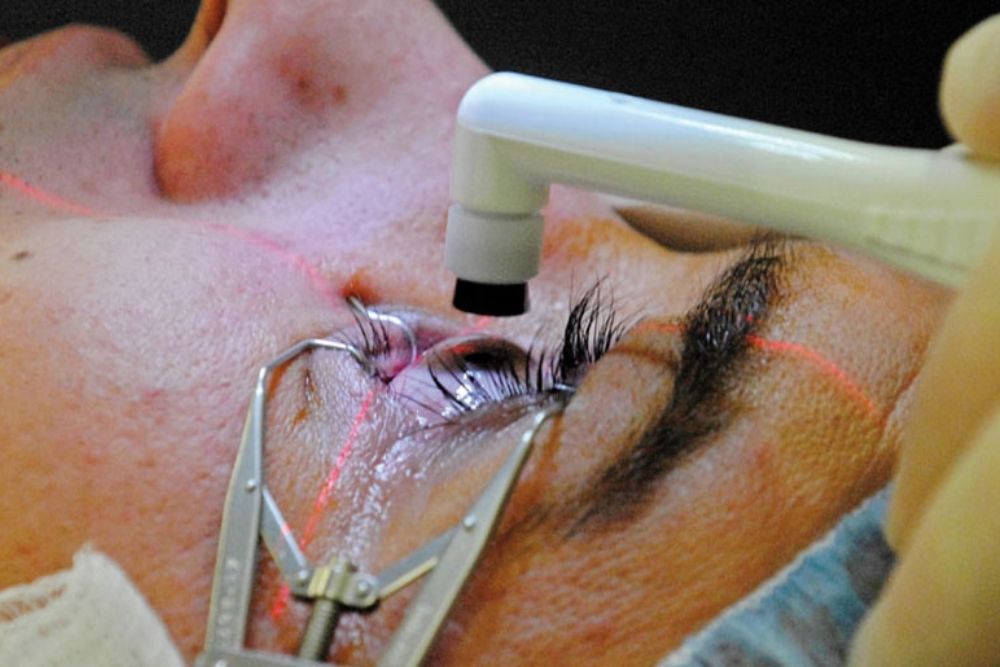If you are considering cataract surgery, it is important to be aware of the potential risks and complications that may occur. While cataract surgery is a relatively safe procedure, there are some risks and complications that can occur. In this blog post, we will discuss the most common cataract surgery complications and risks. We will also provide tips on how to reduce your risk of experiencing these complications.
Contents
What Are The Most Common Complications After Cataract Surgery?

The most common complications after cataract surgery include:
Infection
This can occur if bacteria gets into the eye during surgery and causes inflammation. You might feel pain, redness or discomfort in your eye. Infection happening after surgery is rare but can be serious. Doctors will usually prescribe antibiotics to treat the infection.
Retinal detachment
This happens when the retina, which is a thin layer of tissue at the back of your eye, pulls away from its normal position. You may notice flashes or floaters in your vision and it can put you at risk for permanent vision loss if not treated quickly.
Intraocular lens dislocation
The intraocular lens (IOL) is a small device that replaces the eye’s natural lens after cataract surgery. If it moves out of position, your vision may become blurry and you can experience double vision. Your doctor may need to perform another operation to fix the issue.
Posterior capsular opacification
This occurs when the membrane surrounding the IOL becomes cloudy, which can affect your vision. It’s usually treated with a laser procedure called a posterior capsulotomy.
Glaucoma
This is an increase in pressure inside your eye that can lead to permanent vision loss if left untreated. You may experience pain, redness or blurred vision. Your doctor can prescribe medications to help manage the condition.
Macular edema
This is swelling of the macula, which is a small area in the centre of your retina that’s responsible for sharp central vision. It can cause blurry or distorted vision. Doctors may use laser therapy to treat it.
Posterior capsule rupture
This is a tear or breaks in the membrane that surrounds the IOL. It can cause inflammation and cloudiness in your vision and requires surgery to repair it.
Cystoid macular edema
This is swelling of the retina caused by leakage from blood vessels. It can cause vision changes such as blurred or distorted vision. Treatment may include steroid eye drops, laser therapy and vitrectomy surgery.
Bleeding
This can be caused by improper wound healing or a reaction to the medications used during cataract surgery. You may notice redness in your eye or blurred vision. Doctors may need to perform additional surgery to stop bleeding and repair any damage it might have caused.
Vision Loss
This is a rare but serious complication that can happen if any of the other complications listed here go untreated. It’s important to make sure you attend all of your follow-up appointments with your doctor so they can check for any signs of complications.
It’s important to remember that most people don’t experience any complications from cataract surgery, but it’s still important to be aware of potential risks and to go for regular follow-up appointments with your eye doctor. This will help ensure that any issues can be spotted and treated quickly.
What Is The Failure Rate Of Cataract Surgery?
 Cataract surgery is an extremely safe and effective procedure. The success rate of cataract surgery is higher than 98%, while the failure rate is around 1-2%. Complications are rare but can include infection, inflammation, corneal edema (swelling), retinal detachment and increased intraocular pressure. It’s important to understand that every patient is unique and outcomes may vary, so it’s best to speak with your surgeon about the risks and benefits of cataract surgery.
Cataract surgery is an extremely safe and effective procedure. The success rate of cataract surgery is higher than 98%, while the failure rate is around 1-2%. Complications are rare but can include infection, inflammation, corneal edema (swelling), retinal detachment and increased intraocular pressure. It’s important to understand that every patient is unique and outcomes may vary, so it’s best to speak with your surgeon about the risks and benefits of cataract surgery.
Additionally, if you are considering cataract surgery, it’s important to choose a qualified eye surgeon who is experienced in performing these types of procedures. Your doctor will be able to discuss the risks and benefits of cataract surgery with you in detail so that you can make an informed decision about your best course of treatment.
If you have any questions or concerns about cataract surgery, please contact your doctor for more information. We provide effective Cataract Surgery in Delhi.
When To Call A Doctor For Eye Complication?
 If you experience any of the above-mentioned signs or symptoms, you should call a doctor right away. It is important to seek medical advice as soon as possible to prevent the eye problem from worsening and to get proper treatment.
If you experience any of the above-mentioned signs or symptoms, you should call a doctor right away. It is important to seek medical advice as soon as possible to prevent the eye problem from worsening and to get proper treatment.
Additionally, if you have diabetes or other illnesses that affect your eyes, it is important for you to stay on top of your eye care and regularly visit an optometrist or ophthalmologist for checkups. They can also provide you with tips on how to keep your eyes healthy, such as wearing sunglasses, eating eye-friendly foods, and avoiding activities that strain the eyes. Finally, if you experience a sudden change in your vision or an injury to your eye, it is essential to see a doctor right away. Untreated eye problems can lead to loss of vision or even blindness, so it is important to take any changes in your eyes seriously.
If you have any concerns about your eye health, don’t hesitate to call a medical professional for advice and treatment. Early intervention can protect your precious vision and keep your eyes healthy for many years to come.
Additionally, if you experience new floaters or flashes of light in your vision, it is important to make an appointment with a doctor for further evaluation. Floaters and flashes can be a sign of a detached retina or other serious eye problems, so it is important not to ignore them. By taking the time to seek medical advice, you can preserve your vision and protect your eyes from the dangers of eye complications.
Remember — if you have any concerns about your eye health, don’t wait to contact a doctor or optometrist. With prompt diagnosis and treatment, you can reduce your risk of serious eye problems and protect your vision.
Conclusion
In conclusion, cataract surgery complications and risks are very rare and can be managed in most cases. Most people who have cataract surgery experience positive vision outcomes, improved quality of life, and better overall eye health. However, it is important to weigh the potential risks against the potential benefits when deciding whether or not to pursue a cataract surgery procedure. In addition, it is important to choose an experienced eye doctor and facility that is capable of handling any unexpected issues or complications. Ultimately, it is up to the patient to decide whether cataract surgery is the right choice for them.
Cataract surgery is a safe and painless procedure. At MantraCare we have a team of experienced eye surgeons, who will be happy to answer your any questions on cataract surgery. Call us at +91-9711116605 for any inquiries.
